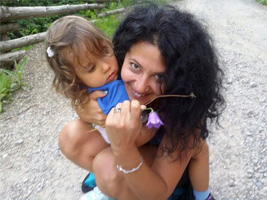by Raluca Postolache
We, parents, love our children dearly but sometimes use words and methods that impact them beyond our intention, sometimes negatively. Parenting is a great privilege we are gifted, it is fun but also a challenging, overwhelming job. There are moments when we can’t hear our own thoughts so the empathy, tolerance, patience, just fade away. We end up saying things we don’t really mean and the one I want to refer to here is, monster.
Oxford Dictionaries defines, monster, as follows:
a) A large, ugly, and frightening imaginary creature.
b) An inhumanly cruel or wicked person.
c) A thing of extraordinary or daunting size.
d) A congenitally malformed or mutant animal or plant.
In our parenting life we use monster to express our frustration towards a child when he or she challenges our comfort zone. That is: he puts himself in dangerous situations, has no patience, throws tantrums, feels intense feelings of all kind and cries, hits or bites, jumps on the bed, shouts at pears, refuses to be obedient, expresses his unicity and personality as raw as it could get, pretty much anything that means, the child does not do, what we expect him to do. Monster is used, often, with a pampering connotation but it is loaded with the heaviness of our feelings, the feelings of annoyance. Else, we would just call him, little bunny, turtle, honey, and so on.
We think it’s cute so, we use it in books, we use it in songs, we use it in naming play grounds, we use it on their beds, rooms, pajamas, food, cartoons, games, on their plates, cups, clothes, we use it when we want to give them a cuddle (Come here little monster, let me give you a hug.), we use it every day at home, in the park, at kindergarten, at school, when we talk about them with our friends, we read it in their good night stories, we just use it but seldom find the minute to acknowledge what it really means, what is the message received by the child, what are immediate and long term implications and how much fear comes with it.
Why is it present everywhere? Why did we accept it in our daily vocabulary so easily? Yes, I hear you. It’s packaged nicely. Still, the association, as subtle as it can be, of a child with a monster leaves an ugly, fierce, imprint on our children.
“Young children’s relationships with their primary caregivers have a major impact on their cognitive, linguistic, emotional, social, and moral development. These relationships are most growth-promoting when they are warm, nurturing, individualized, responsive in a contingent and reciprocal manner, and characterized by a high level of ‘goodness of fit.”(National Research Council, 2000, p.341)
Children are our cleanest mirrors. If we tell a child: “This is an apple” or “You are a monster” (any other name, for that matter, naughty, brat, fatty, etc.) they will believe us. Their analytical brain is not yet developed to debate what we mean by that. The brain will just make associations. Between 3 to 5 years old children’s focus on learning words and developing their vocabulary, is massive. It is of utmost importance to ensure they hear as many positive words, about themselves and others, as possible. Children this young cannot, yet, comprehend the nuances of the words or if we use them metaphorically. They pick the word and they become the word.
The first seven years of life are crucial for their development. This is when the foundation is laid. This is when they internalize any information received and, as unwritten books, they will manifest it in their day to day behavior. When we call them monsters, we actually, unintentionally, invite them to behave like one. The probability of feeling unloved, insufficient, confused, raged, shy or frightened grows.
Won’t our children find it normal to use the same term with other beings? Does this, name (read monster) calling teaches emotional intelligence, empathy, compassion or altruism? What is their perception of a monster? What do they actually hear when they are called monsters? What monster image do they recall?
The least monsters do is, create fear. A fearful person finds it hard to sleep and rest, becomes aggressive, defensive, unable to act upon their full potential, they feel unable to self-regulate and are generally stressed.
We certainly don’t mean any of those for our children so I think it’s a great opportunity for a paradigm shift.
Your child, or mine, is NO monster!





